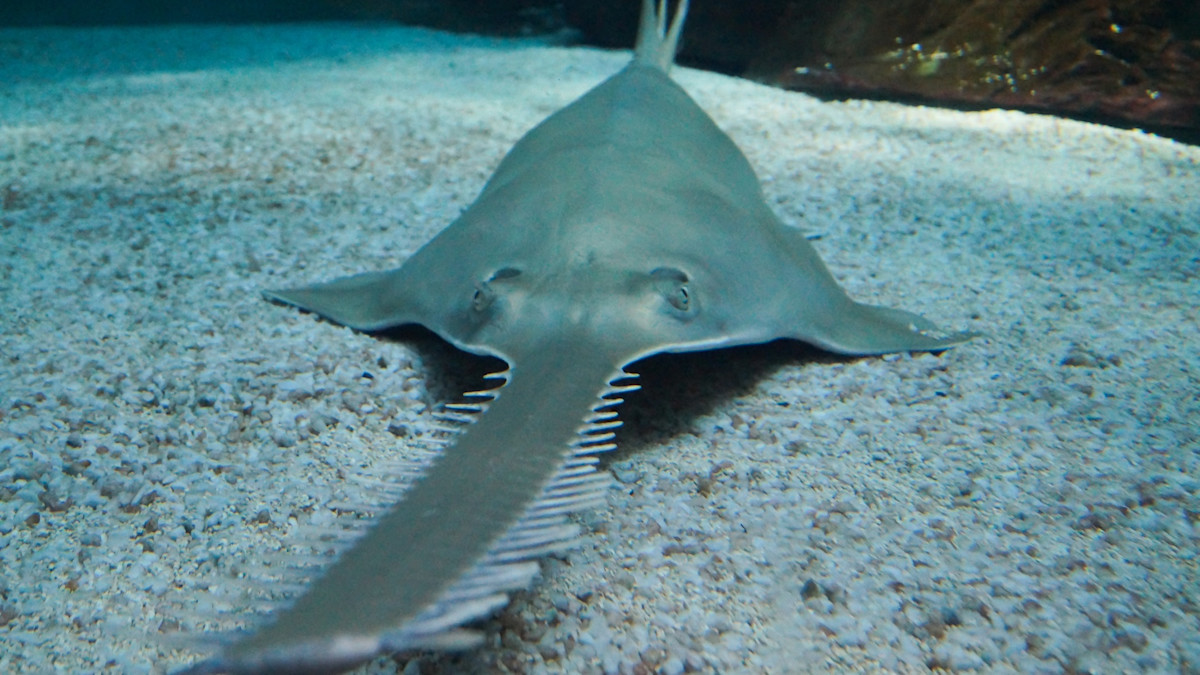Mysterious “Spinning” Fish and Sawfish Die-Off Stump Biologists

A new phenomenon has been raising some eyebrows among anglers in the waters surrounding the Florida Keys. According to an article by the Bonefish Tarpon Trust (BTT), reports of lethargic fish swimming upside-down in circles began to trickle in early last November.
To date, BTT has received 57 reports of this behavior, affecting as many as 25 species of fish. Early reports were localized, mostly between Bow Channel and Key West, and generally reported at night after fish experienced some sort of adverse stimulus, such as nets or exposure to bright lights. Eventually, the whirling behavior began to be observed during the day, and sightings began to expand to areas closer to Miami.
In addition to the whirling symptoms, critically endangered smalltooth sawfish have also been reported sick or dead in the area. According to Kelly Richmond at Florida’s Fish and Wildlife Conservation Commission (FWC), 16 smalltooth sawfish have been found dead, and more have been found symptomatic in the Keys.
Sawfish don’t reach breeding age until they are eight- to ten-years-old and currently are only found in the waters off of the southern tip of Florida. “There have been pockets of fish death in other species, but mostly, we’re seeing whirling,” Richmond said.
Goliath grouper, permit, tarpon, mullet, lemon sharks, and other large, predatory fish are among the dozens of species of fish that have been reported to be affected by the whirling condition. It’s not clear just yet if the dead sawfish and the whirling symptoms in other fish are connected, but it is being looked into.
When reached for comment, Florida’s Fish and Wildlife Conservation Commission (FWC) provided a statement saying they are “documenting reports of smalltooth sawfish in the Lower Keys.”
“Currently the cause is unknown. FWC continues to coordinate with partners to analyze samples. The FWC has also been documenting reports of abnormal fish behavior (spinning and whirling) in the Lower Keys (e.g. Summerland Key, Big Pine Key, Little and Big Torch Keys). FWC is working with partners and stakeholders to investigate the behavior. At this time, the cause of the abnormal behavior is not known, and efforts to collect and analyze samples are ongoing,” the agency said.
The consistency of sightings has led to the formation of a collaborative study led by The Bonefish Tarpon Trust (BTT) and the Lower Keys Guides Association (LKGA). With partners including the Florida Fish and Wildlife Conservation Commission and biologists from various universities, the study hopes to find the cause of the outbreak.
Testing results from initial water and fish samples have ruled out abnormalities such as viruses, parasites, red tide, or other contaminants. However, algal blooms containing elevated levels of a naturally occurring toxin called ciguatera, or ciguatoxin, were found in areas where affected fish were known to congregate. Produced by an algae calledGambierdiscus, ciguatoxins are among the most commonly reported marine toxins. Generally, the toxin is found to accumulate in the skin, head, viscera, and roe of fish that feed along the coral reefs where this algae may be found and is known to bioaccumulate in larger fish higher up the food chain.
While not typically dangerous to fish, this toxin has been known to be quite harmful and sometimes even fatal in humans. Symptoms can last for days or even years and include vomiting, diarrhea, and a strange neurological condition where hot and cold sensitivities are reversed.
In Florida alone, ciguatera poisoning affects roughly 1,000 people per year, so this isn’t entirely new. However, having multiple, ongoing reports of death or sickness across a diaspora of fish species is.
So far, a link between the sick fish and the algae bloom has not been proven, but as of now, it’s the strongest working theory. And if ciguatera is making these fish sick, biologists are still unsure as to why.
Last summer, water temperatures off the southern coast reached an unprecedented high of 101 degrees Fahrenheit and bleached corals into the Keys. Scientists are currently comparing water samples from areas affected by that heat wave against cooler waters to look at the possible connections, such as increased toxin levels in warmer areas.
What should you do if you see dead or whirling fish in the Keys? The FWC is asking that any sightings be reported to the FWC Fish Kill Hotline at 800-636-0511 or atMyFWC.com/ReportFishKilland that all healthy, sick, injured, or dead sawfish be reported to FWC’s Sawfish Hotline at 844-472-9374 or via email at[email protected].
Shop
Sign In or Create a Free Account
Related

Wildlife Management
Biologists Unravel the Mysterious Case of the Hanging Fawn

Wildlife Management
Mysterious “Spinning” Fish and Sawfish Die-Off Stump Biologists



